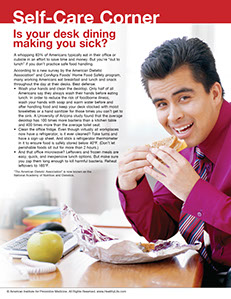SYMPTOM CHECKER
CONDITIONS
Male
Female
Child
Arm, Hand & Shoulder Concerns
Legs & Feet Concerns
Dental & Mouth Concerns
Ear & Nose
Eye Conditions
Head Conditions
Arm, Hand & Shoulder Concerns
Legs & Feet Concerns
Front
Back
Arm, Hand & Shoulder Concerns
Dental & Mouth Concerns
Ear & Nose
Eye Conditions
Head Conditions
Arm, Hand & Shoulder Concerns
Dental & Mouth Concerns
Ear & Nose
Eye Conditions
Head Conditions
Front
Back
Arm, Hand & Shoulder Concerns
Neck Links
Head & Neck Concerns
Arm, Hand & Shoulder Concerns
Neck Links
Head & Neck Concerns
Front
Back
Online Clinic
Wise Healthcare
Is your desk dining making you sick?
Print on Demand
A whopping 83% of Americans typically eat in their office or cubicle in an effort to save time and money. But you’re “out to lunch” if you don’t practice safe food handling.
According to a new survey by the American Dietetic Association* and ConAgra Foods’ Home Food Safety program, many working Americans eat breakfast and lunch and snack throughout the day at their desks. Best defense:
• Wash your hands and clean the desktop. Only half of all Americans say they always wash their hands before eating lunch. In order to reduce the risk of foodborne illness, wash your hands with soap and warm water before and after handling food and keep your desk stocked with moist towelettes or a hand sanitizer for those times you can’t get to the sink. A University of Arizona study found that the average desktop has 100 times more bacteria than a kitchen table and 400 times more than the average toilet seat.
• Clean the office fridge. Even though virtually all workplaces now have a refrigerator, is it ever cleaned? Take turns and have a sign-up sheet. And stick a refrigerator thermometer in it to ensure food is safely stored below 40ºF. (Don’t let perishable foods sit out for more than 2 hours.)
• And that office microwave? Leftovers and frozen meals are easy, quick, and inexpensive lunch options. But make sure you zap them long enough to kill harmful bacteria. Reheat leftovers to 165ºF.
*The American Dietetic Association* is now known as the National Academy of Nutrition and Dietetics.
This website is not meant to substitute for expert medical advice or treatment. Follow your doctor’s or health care provider’s advice if it differs from what is given in this guide.
The American Institute for Preventive Medicine (AIPM) is not responsible for the availability or content of external sites, nor does AIPM endorse them. Also, it is the responsibility of the user to examine the copyright and licensing restrictions of external pages and to secure all necessary permission.
The content on this website is proprietary. You may not modify, copy, reproduce, republish, upload, post, transmit, or distribute, in any manner, the material on the website without the written permission of AIPM.
2021 © American Institute for Preventive Medicine - All Rights Reserved. Disclaimer | www.HealthyLife.com
















































